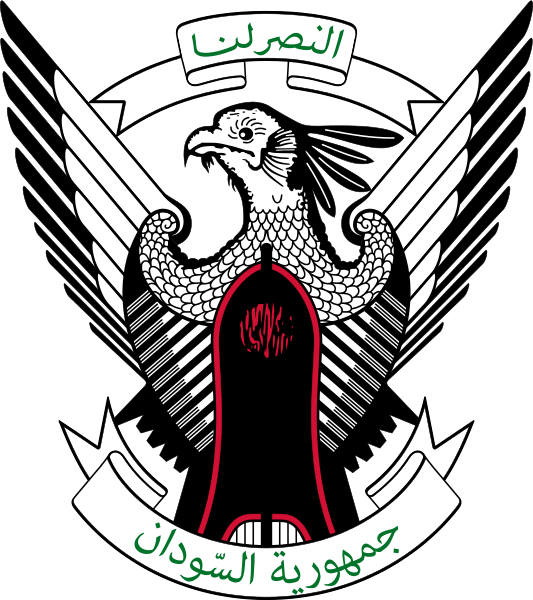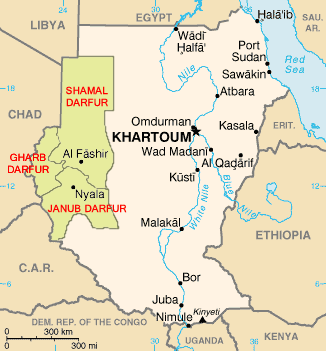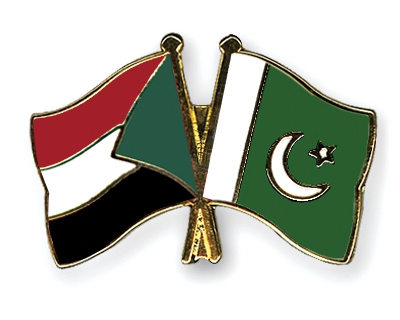|
 Republic of Sudan sometimes referred as the North Sudan is the third largest country in the Africa. Before separation of South Sudan in July 2011, Sudan was the largest country in the African Continent. Geographically Sudan is located in the Northern Africa which is bordered with Egypt in north, Ethiopia, Eritrea and Red Sea are located in east, South Sudan is sited in south, western borders are connected to Chad and north western to Libya. Total Area of Sudan is 1,886,068 Sq. Km. Population as per 2008 census is 30,894,000. Capital of Sudan is Khartoum and Arabic is its national language. In the 2005 Constitution English was also declared as official language of Sudan with Arabic. Major religion is Islam with 97% population follows it. Literacy rate in Sudan is 72 percent.
Republic of Sudan sometimes referred as the North Sudan is the third largest country in the Africa. Before separation of South Sudan in July 2011, Sudan was the largest country in the African Continent. Geographically Sudan is located in the Northern Africa which is bordered with Egypt in north, Ethiopia, Eritrea and Red Sea are located in east, South Sudan is sited in south, western borders are connected to Chad and north western to Libya. Total Area of Sudan is 1,886,068 Sq. Km. Population as per 2008 census is 30,894,000. Capital of Sudan is Khartoum and Arabic is its national language. In the 2005 Constitution English was also declared as official language of Sudan with Arabic. Major religion is Islam with 97% population follows it. Literacy rate in Sudan is 72 percent.
 Sudan achieved independence from Anglo-Egyptian Rule on January 01, 1956. Sudan is Member of United Nations, Organization of Islamic Cooperation, African Union, and Arab League. As per historical accounts the earlier kingdom in Sudan was Nubian state, comprising of land between Blue Nile, White Nile and River Atbara named as Kingdom of Kush, established in 1700 BC after the disintegration of Egyptian Kingdom. After the downfall of Kushite Empire in 4th Century AD several states emerged, one of which was Alawa (Alodia) that is modern day Sudan. In the 6thCentury Christian missionaries preached Christianity and converted the Nubian Kings to Christianity which influenced the popularity of the Christian religion among the masses.
Sudan achieved independence from Anglo-Egyptian Rule on January 01, 1956. Sudan is Member of United Nations, Organization of Islamic Cooperation, African Union, and Arab League. As per historical accounts the earlier kingdom in Sudan was Nubian state, comprising of land between Blue Nile, White Nile and River Atbara named as Kingdom of Kush, established in 1700 BC after the disintegration of Egyptian Kingdom. After the downfall of Kushite Empire in 4th Century AD several states emerged, one of which was Alawa (Alodia) that is modern day Sudan. In the 6thCentury Christian missionaries preached Christianity and converted the Nubian Kings to Christianity which influenced the popularity of the Christian religion among the masses.
Islam was introduced in the Sudan by the Arab immigrants & traders from egpyt which was conquered by Muslim in 7th Century.Sufism played vital role in spreading Islam in the region. In 16th Century Sheikh Taj Uddin Bokhari who was a Sufi of Qadri Order established by Sheikh Abdul QadirJilani of Baghdad, Iraq, played eminent role in preaching Islam in Sudan. In the same era Funj dethroned the Christian king of the Alawa and established the As-Saltanaaz-Zarqa (the Blue Sultanate). Funj dynasty ruled Sudan for three centuries. During the Funj dynasty the Muslims from Egypt and Syria migrated to Sudan and preached Islam. Funj Kings and later Mahdi state played vital role in development of identity and political ideology of the Sudanese. Muhammad Ali, Ottoman Ruler of Egypt conquered Sudan in nineteenth century. After the British occupation of Egypt in 1882, Sudan was also taken over by British Colonial System in 1898. Sudan was governed by Anglo-Egyptian rule till its independence in 1956.
Since its independence Sudan has been a victim of political instability and internal conflicts, which have hampered progress of the country despite having vast reserves of natural resources. The first civil war that started in 1955 lasted for 17 years and ended in 1972 after the signing of Addis Ababa agreement. The internal conflicts also resulted in mass displacement of people.
With the implementation of Shariah law in 1983, conflict between the Muslim majority North and Christian/Animist South further intensified. The second civil war between Southern Sudan Liberation Movement/Army (SSLM/A) and Government of Sudan started in 1983 which is one of the deadliest wars of the twentieth century that resulted in almost 1.9 million causalities. This civil war is also seen in the backdrop of efforts to control oil reserves in South Sudan by the imperial powers as done in the other parts of the world through aggravating internal conflicts and invasions on pretexts of humanitarian grounds. President Omar Al-Bashir (current President of Sudan and leader of the National Congress Party) eventually led to the signing of the Comprehensive Peace Agreement (CPA) in 2005 which brought the second civil war to an end.
South Sudan separated from Sudan after referendum in 2011 in which 98% people voted for independence from Sudan. South Sudan has struggled to achieve a stable government since becoming independent from Sudan in 2011. The unrest in South Sudan and urge to intervene in the South Sudan is a clear indication of western interests in the country's oil resources.
 In 2003, while the north-south conflict was on its way to resolution, Darfur (a region in western Sudan) crisis, surfaced. Darfur conflict is of ethnic and tribal nature. On one side there is militia of Arab Tribes named as "Janjaweed" while on the other side are rebel groups, including the Sudan Liberation Movement and the Justice and Equality Movement. In 2006 Darfur Peace Agreement (DPA) was signed between Government of Sudan and Sudan Liberation Movement. However, the conflict in Darfur intensified shortly thereafter as some of the rebel groups refused to signthe agreement. Peace process for Darfur is in progress after another Darfur Peace Agreement in 2011 in Doha.
In 2003, while the north-south conflict was on its way to resolution, Darfur (a region in western Sudan) crisis, surfaced. Darfur conflict is of ethnic and tribal nature. On one side there is militia of Arab Tribes named as "Janjaweed" while on the other side are rebel groups, including the Sudan Liberation Movement and the Justice and Equality Movement. In 2006 Darfur Peace Agreement (DPA) was signed between Government of Sudan and Sudan Liberation Movement. However, the conflict in Darfur intensified shortly thereafter as some of the rebel groups refused to signthe agreement. Peace process for Darfur is in progress after another Darfur Peace Agreement in 2011 in Doha.
Sudan is a country rich in oil, uranium, gold and copper and natural resources that have been coveted by superpowers for decades and waged conflicts in the country. Due to civil wars and crisis Sudan has been divided into north and south Sudan; also disturbed relations of Sudan with its neighbors. Sudan has been affected by internal disturbances for three quarters of its existence. The economic progress also suffered due to these conflicts. The GDP growth of the Sudan is 4.4 percent. Oil accounts for 70-90% of Sudan's exports. Sudan exports 4.60 billion USD worth of goods and its imports are of USD 6.20 billion. The current government has taken initiatives to enhance the economic growth of the country.
 Relations between Pakistan and Sudan are based on strong Islamic bond and political connections. Both the countries are striving for further strengthening of mutual ties. Pakistan has also suffered from political instability since its inception and violence after the start of war on terror in 2001. Pakistan has also lost its half part due to internal conflict and international conspiracy. Both the countries can share their experience to effectively resolve their internal issues. Both the countries are members of OIC. Pakistan and Sudan can play their role in bringing unity among Muslims through OIC platform.Like Pakistan,Sudan has refused to acknowledge the usurper state of Israel and fully supports the Palestinian cause.
Relations between Pakistan and Sudan are based on strong Islamic bond and political connections. Both the countries are striving for further strengthening of mutual ties. Pakistan has also suffered from political instability since its inception and violence after the start of war on terror in 2001. Pakistan has also lost its half part due to internal conflict and international conspiracy. Both the countries can share their experience to effectively resolve their internal issues. Both the countries are members of OIC. Pakistan and Sudan can play their role in bringing unity among Muslims through OIC platform.Like Pakistan,Sudan has refused to acknowledge the usurper state of Israel and fully supports the Palestinian cause.
China has been involved in the development of Sudan by investing in the oil Sector of the country since 1990's. China has also been an economic partner and close friend of Pakistan since 1950's. China, Pakistan and Sudan can forge economic partnership to better serve common interests. It will also enhance political influence of Pakistan and Sudan in their respective regions and internationally.
Pakistan's exports to Sudan amount to USD 67 million and imports up to USD2.20 million and the trade between the countries is steadily increasing. Sudan imports cement, steel, rice and electrical equipment and exports cotton and leather to Pakistan. Pakistan also contributed to the UN peacekeeping force in Sudan with 1,542 personnel and 92 Observers. Pakistan and Sudan can cooperate in the fields of research, technical education, military and economic sectors. Pakistan is also supporting Sudan with higher education as more than five hundred students from Sudan study in the universities of Pakistan which is the highest number of Sudanese students to any foreign country. Sudan has donated generously in the relief efforts during earthquake in 2005 and floods in 2010 in Pakistan.
With shared Islamic bond as well as historical baggage of colonial rule and internal conflicts, both Pakistan and Sudan have vast potential for benefiting from each other's experience. Through a common and sincere friend China, both can cement ties in geo-strategic, economic, defence, telecommunication, transportation infrastructure, energy, education, health and such like fields for prosperity. Besides, closer cooperation between the two brotherly countries would help improve their standing at regional as well as international level. With mutual support, they can play vibrant role in different forums, of which they are members, for united stance on issues of common interest, particularly those relating to the Muslim Ummah.
|